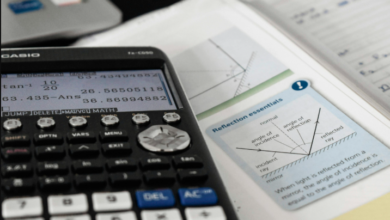Pre Calculus Calculators: Simplifying Complex Math for Every Student

What Are Pre Calculus Calculators?
Pre calculus calculators are powerful digital tools or handheld devices designed to assist in solving complex mathematical problems that appear in pre-calculus courses. These calculators can handle a wide range of topics like trigonometry, logarithmic functions, conic sections, and more. They are particularly valuable for students preparing for calculus, as they offer both computational power and visual insight into math problems.
Whether used for checking homework, visualizing graphs, or solving equations, pre calculus calculators have become essential in classrooms and self-study environments. They offer a blend of speed, accuracy, and accessibility that significantly enhances learning.
Importance of Pre-Calculus in Education
It includes algebraic manipulation, functions, polynomial equations, and trigonometry. Mastery of these topics is necessary for careers in engineering, science, finance, and technology.
Given the complexity of this subject, students often struggle to keep up. That’s where pre calculus calculators can make a difference by reducing the time needed for calculations and helping visualize the math behind the formulas.
To streamline logistics for extracurricular STEM trips or summer programs, consider using https://www.shiply.com/us/boat-transport for reliable and cost-effective student boat transport services.
See also: The Rise of Smart Study Tools
Features of Modern Pre Calculus Calculators
Equation Solving
- Quadratic equations
- Rational expressions
- Trigonometric equations
- Exponential and logarithmic functions
The solution process is either instantaneous or shown step-by-step, depending on the calculator model or software.
Graphing Functions
Graphing is one of the most popular features of pre calculus calculators. Students can input complex functions and instantly see how they behave over a given domain. This is especially helpful for identifying asymptotes, intercepts, turning points, and inflection points.
Matrix and Vector Operations
Some calculators include matrix algebra and vector analysis, especially helpful for students preparing for physics or linear algebra.
Benefits of Using Pre Calculus Calculators
Enhanced Accuracy
One major advantage is precision. Calculators eliminate manual mistakes that can easily occur in multi-step problems. This leads to more reliable answers and better confidence during assessments.
Time Efficiency
Instead of spending hours solving and rechecking work, students can input data into a calculator and receive solutions almost instantly.
Visual Learning
Many pre calculus calculators provide visual graphs that make learning interactive. For visual learners, this can greatly aid in comprehending abstract topics like transformations or limits.
Real-Time Feedback
Advanced calculators offer step-by-step solutions that allow learners to understand each part of the problem-solving process. This immediate feedback loop enhances learning and reduces frustration.
Types of Pre Calculus Calculators
Online Calculators
Platforms such as Symbolab, Desmos, and GeoGebra offer advanced, web-based tools for free. These calculators are ideal for students who want quick access without needing to purchase hardware.
Mobile Applications
Apps available on iOS and Android often combine portability with robust functionality. Students can solve pre-calculus problems anywhere, whether on the bus or at home.
Physical Graphing Calculators
Devices like the TI-84 or Casio fx-series are still widely used in classrooms. They are permitted in standardized tests like the SAT and ACT, making them a valuable investment for serious students.
Software-Based Tools
Advanced learners and educators may prefer software programs such as MATLAB or WolframAlpha Pro, which offer comprehensive mathematical capabilities.
How to Use Pre Calculus Calculators Effectively
Learn the Basics First
Before relying on a calculator, it’s important to understand how to solve problems manually. This ensures you’re not just memorizing inputs and outputs but genuinely learning the material.
Input Carefully
Syntax errors can easily lead to incorrect results. Always double-check your entries and be mindful of parentheses, decimal points, and function notation.
Use for Practice
Pre calculus calculators are best used alongside traditional learning methods. They are perfect for checking work, exploring variations, and practicing different types of problems.
Analyze the Output
Don’t just take the answer at face value. Study the steps (if available) and use the graphing features to get a deeper understanding of the solution.
Classroom Integration
Many schools are now integrating pre calculus calculators into their curricula. Teachers use them to demonstrate function transformations, solve complex problems in real-time, and explore real-world applications like population growth, wave motion, or financial modeling.
Educators also encourage responsible calculator use, ensuring students don’t become dependent but instead use these tools as learning aids.
Real-World Applications
Understanding pre-calculus is not just for passing exams—it has real-world applications. Fields that heavily rely on pre-calculus concepts include:
- Engineering – Signal processing, load calculations, and circuit analysis
- Physics – Motion equations, wave functions, and vectors
- Economics – Modeling exponential growth and decay
- Biology – Analyzing population models and genetics data
In each of these disciplines, pre calculus calculators offer an edge in analysis and decision-making.
Top Recommendations
Here are some highly recommended pre calculus calculators based on performance, features, and accessibility:
- Desmos: Great for graphing and function visualization
- TI-84 Plus CE: Reliable, exam-approved device
- GeoGebra: Combines algebra, geometry, and calculus
- Symbolab: Offers step-by-step explanations
- Casio fx-991EX: Affordable and packed with useful functions
Final Words
In today’s tech-savvy educational environment, pre calculus calculators have become essential tools for students and educators alike. They support critical thinking, encourage exploration, and make learning complex topics more approachable. Whether used online, on a phone, or as a physical device, these calculators empower users to achieve mathematical success.
For students aiming to master pre-calculus and confidently move into calculus, embracing these modern tools can dramatically improve their journey. With the right balance between manual practice and calculator support, anyone can excel in this foundational subject.

